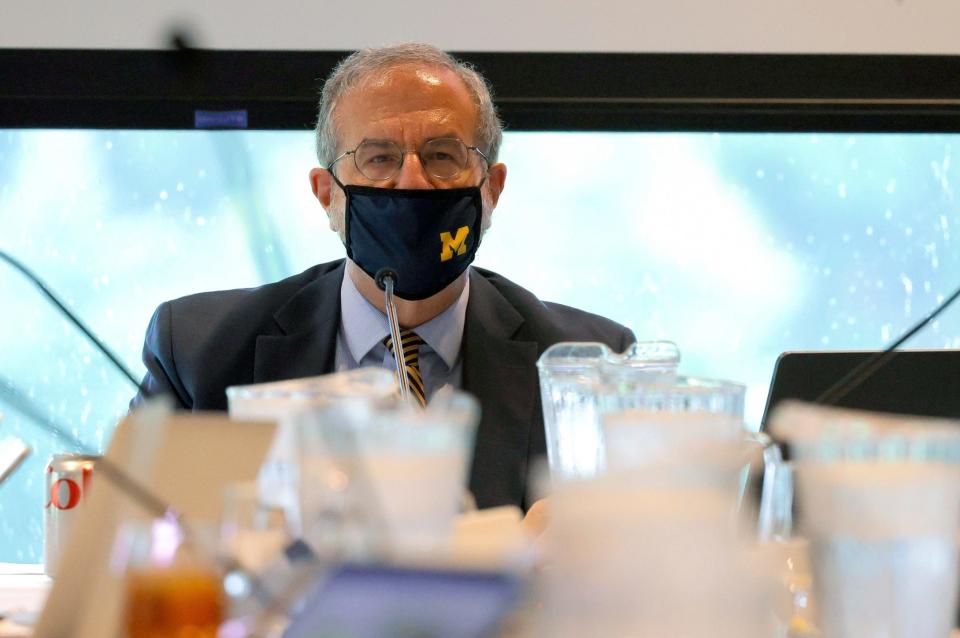The U-M Board of Regents seeks to move on from Mark Schlissel's legacy
- Oops!Something went wrong.Please try again later.
- Oops!Something went wrong.Please try again later.
The University of Michigan's interim president, Mary Sue Coleman, said Thursday that her pride in U-M's legacy is what brought her back to a role she held for more than a decade as she addressed the Board of Regents during its first public meeting since firing former President Mark Schlissel on Jan. 15.
Coleman, who preceded Schlissel as U-M's president and served 12 years in the role, is filling in, serving as president until a permanent replacement can be found for Schlissel, who was fired for having an inappropriate relationship with a subordinate but who remains on U-M's faculty.
Coleman began Thursday's meeting by reaffirming her pride in all the university has achieved since its inception. She then said a former student reached out to her about feeling disillusioned by his alma mater in recent months.
"For all of its flaws, the University of Michigan has always been about learning," she said, citing the student's letter. "We're about that intellectual spark, it creates a bond between teacher and student and the learning that joins both. That joy of learning is what has carried us as an institution through the decades, it is why we endure. The institution is the purpose made permanent."

Schlissel's departure made national headlines and sparked student celebrations. And, yet, board members did not mention or affirm their decision to fire him, despite the school saying they would in a previous news release. The agenda packet included the "Report of Emergency Action Taken," which enabled the eight-member board to fire Schlissel in between its monthly meetings, but it was not discussed at all during Thursday's meeting.
Salary: U-M interim President Mary Sue Coleman to be paid same as Schlissel
More: U-M has firm searching for Schlissel replacement: What we know
Board chair Jordan Acker thanked Coleman for her willingness to return to the school during this time of "transition."
He said the search for the next president is off to a great start, although it is still in its early stages.
Carbon neutrality is a hot-button issue on campus and something many students feel passionately about, and Coleman requested the approval of a new geo-exchange plant that would provide heating and cooling and does not rely on natural gas. This move follows the President's Commission on Carbon Neutrality's recommendations, which was created during Schlissel's tenure.
Schlissel's fall from grace was characterized by the release of pages and pages of flirty emails with the subordinate, who was not publicly named. His tenure overall was defined by numerous sexual assault scandals involving the university as well as his COVID-19 pandemic response, which led to a faculty vote of no confidence against him.
An ongoing investigation is looking into whether Schlissel, who remains on the U-M faculty, misused university funds in support of his relationship with an employee.
In January 2020, Martin Philbert, U-M's provost and second in command to Schlissel, was placed on leave while an investigation into sexual misconduct was completed. The investigation found Schlissel had some warning about Philbert.
A month later, more troubling news arrived. The university was conducting an investigation into allegations of sexual assault by longtime athletics doctor Robert Anderson, who had died in 2008.
Although Schlissel was not president when Anderson worked at U-M in 1968-2003, he came under fire for his response to the allegations.
The University of Michigan reached a $490 million settlement shortly after Schlissel's firing. Over 1,000 former athletes and other U-M students sued the university in federal court, claiming the university failed to act when it knew Anderson was sexually assaulting students.
Multiple public commenters addressed the Board on Thursday to discuss their anger and disappointment at the school's handling of sexual misconduct allegations.
More: Oakland Hills Country Club fire: Everything we know about the iconic Michigan golf course
More: AppleTV+ thriller 'Severance' is your worst workplace nightmare ... and your boss' dream?
The Free Press reported exclusively in September 2021 that several members of the board had long been disappointed in Schlissel's approach to the job, including his lack of skills with regard to certain responsibilities: meeting donors, setting a climate for the school and engaging with students, faculty, staff and the community as the figurehead of the university.
However, all of this dissatisfaction was discussed behind closed doors until his eventual firing.
Free Press staff writer David Jesse contributed to this report.
Contact Emma Stein: estein@freepress.com and follow her on Twitter @_emmastein.
This article originally appeared on Detroit Free Press: The U-M Board of Regents seeks to move on from Schlissel's legacy

